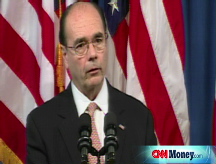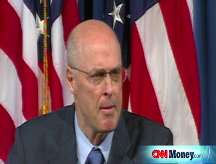Men in suits - few answers
Scenes from the 'background briefing' after the government takeover of Fannie Mae and Freddie Mac.
WASHINGTON (Fortune) -- There were no shortage of questions following the announcement Sunday morning of the massive government takeover of Fannie Mae and Freddie Mac. The cost to taxpayers? The outcome for shareholders? Will this bailout lead other big companies to take too much risk?
Treasury Secretary Henry M. "Hank" Paulson read a four-page single-spaced statement for television - then exited the stage.
What followed was a peculiar Washington institution known as a background briefing: With the cameras turned off, four men in suits took seats behind a table. For more than an hour, they patiently explained the ins and outs of the government takeover of Fannie and Freddie. Under the agreed-upon rules, they can be identified only as "senior government officials."
Some of what they said was useful. For example, no taxpayer money will be injected - for now - into Fannie and Freddie. The two troubled mortgage companies are each giving the Treasury $1 billion worth of senior preferred stock and the right to buy just under 80% of their common stock at a nominal cost. This all but wipes out their common stockholders - though no one would confirm that at the briefing.
In exchange, the government has promised to keep the mortgage giants solvent, reassuring holders of their collective $5.4 trillion of debt. Debt holders, including most U.S. banks and central banks around the world, can breathe a sigh of relief.
In addition, Fannie and Freddie agreed to shrink themselves dramatically, reducing their portfolio of mortgages and mortgage-backed securities from about $800 billion each to $250 billion each over the next 10 years or so. Their CEOs have been replaced.
That's close to unconditional surrender, and evidence Fannie and Freddie were in a heap of trouble. They are essentially paying the government to take them over and turn them into mere shadows of their once-formidable selves.
One of the "senior government officials" explained why: "Their financial condition is deteriorating. There are growing losses in their credit books. Their ability to raise capital was impaired."
So how long could they have lived on without a bailout, he was asked? He declined to speculate.
Now, however, if their regulator determines that Fannie or Freddie's liabilities exceed their assets, Treasury has promised to step in with a cash infusion to make up the difference. This is a contractual commitment that goes on forever and has a capacity of $100 billion each for Fannie and Freddie. The senior officials said that figure was selected to provide market confidence, and not because the government expected to spend anything close to that.
So how much might this open-ended guarantee eventually cost? The senior officials would not say.
Nor would they say how much taxpayer money would be spent to buy mortgage-backed securities, under a new program designed to keep credit flowing to homebuyers and lower mortgage rates.
Treasury will begin later this month by buying $5 billion of mortgage-backed securities. The money will be invested in guaranteed securities, not the highly risky slices of mortgage debt that have led to tens of billions of dollars in losses for banks and hedge funds when borrowers could not repay.
If all goes well, and the housing market turns around, U.S. taxpayers will benefit from their new investments in mortgages - both because the portfolio will pay interest back to the government and because the availability of credit will speed the recovery of the housing market. This scenario would also limit the risk of the backstopping being provided to Fannie and Freddie.
And if house prices continue to slide?
Well, no one wanted to talk about that and for good reason. Because starting now, the government - meaning taxpayers - has a bigger bet on the future of housing and mortgages than ever before. ![]()
-
 The retail giant tops the Fortune 500 for the second year in a row. Who else made the list? More
The retail giant tops the Fortune 500 for the second year in a row. Who else made the list? More -
 This group of companies is all about social networking to connect with their customers. More
This group of companies is all about social networking to connect with their customers. More -
 The fight over the cholesterol medication is keeping a generic version from hitting the market. More
The fight over the cholesterol medication is keeping a generic version from hitting the market. More -
 Bin Laden may be dead, but the terrorist group he led doesn't need his money. More
Bin Laden may be dead, but the terrorist group he led doesn't need his money. More -
 U.S. real estate might be a mess, but in other parts of the world, home prices are jumping. More
U.S. real estate might be a mess, but in other parts of the world, home prices are jumping. More -
 Libya's output is a fraction of global production, but it's crucial to the nation's economy. More
Libya's output is a fraction of global production, but it's crucial to the nation's economy. More -
 Once rates start to rise, things could get ugly fast for our neighbors to the north. More
Once rates start to rise, things could get ugly fast for our neighbors to the north. More










